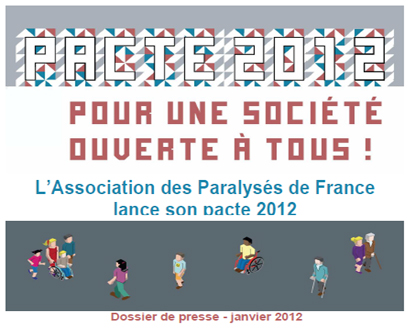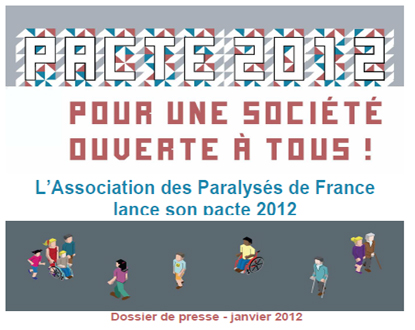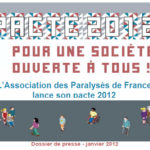The French Association of the Paralyzed (APF) launches its “Pact for an Open Society for All!”, the association’s contribution to an inclusive policy based on “living together”.
 With this document, the APF wishes to appeal to the presidential and legislative election candidates, as well as citizens, on the need to build a society open to all.
With this document, the APF wishes to appeal to the presidential and legislative election candidates, as well as citizens, on the need to build a society open to all.
This pact relies on human rights and republican values: Liberty, Equality, Fraternity.
Signing the APF 2012 pact is asking the President of the Republic and elected deputies to realize these commitments through actions integrated into the political priorities agenda from 2012 onwards.
The APF 2012 Pact for an Open Society for All!
The APF, a representative movement for people with disabilities and their families, launches its “Pact for an Open Society for All!”.
Organized as a triptych around the republican values of liberty, equality, and fraternity, this pact comprises 12 fundamental commitments that form the basis of an open society for all, a “living together” policy.
With 10% of the French population affected by disability, the election candidates cannot afford to overlook the concerns of people with disabilities and their families. These 12 republican commitments carry objectives and actions that resonate with the concerns of every citizen, whether disabled or not.
The 12 commitments of the Pact for an Open Society for All:
Commitment 1: An “Accessible France” by 2015
Commitment 2: The free choice of goods and services
Commitment 3: Spaces, services, and products designed for everyone!
Commitment 4: Accessible transport and roads in all territories
Commitment 5: Access to inclusive education
Commitment 6: Equality in access and staying in employment
Commitment 7: The possibility to exercise one’s rights
Commitment 8: An emotional, romantic, and sexual life for everyone!
Commitment 9: The right to sufficient resources
Commitment 10: Access to healthcare for all, throughout the territory
Commitment 11: Recognition of the “autonomy risk”
Commitment 12: New rights for family caregivers and relatives
The commitments of the pact
– Commitment 1: An “Accessible France” by 2015
→ Objective: Realize access for all to everything, regardless of
living spaces: public spaces, pathways, public and private buildings,
residential, educational, work, leisure, health, religious, commerce, public meetings and debates, voting facilities…
→ Priority action: Adopt a multi-year investment plan “universal accessibility” to make all existing public and private buildings accessible; this plan must include incentives for small communities, small businesses, and specific professional sectors (e.g., tourism), training for all actors, as well as sanction mechanisms.
– Commitment 2: Spaces, services, and products designed for everyone!
→ Objective: Generalize the approach of universal design
to think, from the outset, about all products, services, spaces, and information and communication tools, with ease and quality of use for all.
→ Priority action: Establish a National Accessibility and Universal Design Agency to provide, in a single location identified by all stakeholders, a resource center: information; experience and best practice exchange space; promotion, monitoring and control of public systems; development and coordination of standards; management of a public funding pool.
– Commitment 3: Accessible transport and roads in all territories
→ Objective: Organize an unbroken chain of accessibility in transportation (public transport and roads) in coordination with all actors to allow every person, regardless of mobility capabilities and living location (rural and urban areas), to move freely.
→ Priority action: Impose and ensure compliance with the accessibility standards of all public transport means and road layouts to make urban and interurban buses and coaches, tourist, school and rail, air, and sea transport accessible, as well as stations, platforms
and roads, with larger capacity and in the same conditions of service and performance as everyone else.
– Commitment 4: The free choice of goods and services
→ Objective: Guarantee real access to goods and services to allow everyone to exercise free choice, taking into account the specific needs of all groups in terms of reception, information, communication.
→ Priority action: Strengthen consumer rights,
users or clients to collectively develop conciliation or legal actions with sanctions to combat any discrimination based on disability, age, or illness observed towards individuals.
– Commitment 5: Access to inclusive education
→ Objective: Ensure quality education, schooling, and training for all children and young people with disabilities to allow them to be with all children and young people of their age, paying special attention and organizing an appropriate response for people with specific and/or complex needs.
→ Priority action: Implement, from the start of the school and university year, a support system for any teacher who hosts a child or young person with specific needs, mobilizing adequate and sustainable resources to ensure that every teacher has the necessary human and technical support, appropriate training, adapted teaching tools and the ability to rely on medico-social institutions and services where appropriate.
– Commitment 6: Equality in employment
→ Objective: Strengthen access to employment, guarantee maintenance in employment and work life for people with disabilities to ensure equal access to professional life for all, regardless of the work environment.
→ Priority action: Activate, harmonize and coordinate all existing mechanisms to optimize them within the framework of real management and ongoing consultation of national, regional, and local public training and employment policies to ensure equal treatment of people with disabilities by mobilizing the concerned actors and ensuring the right to suitable measures.
– Commitment 7: The possibility to exercise one’s rights
→ Objective: Facilitate and make equitable access to all common or specific rights to allow everyone to exercise their citizenship and personal rights simply themselves, their families, or surroundings.
→ Priority action: Establish public information services close to residents throughout the territory on all common or
specific citizens’ rights, to guarantee everyone’s knowledge and effectiveness of rights, and ensure professional training to take into account specific or even complex situations.
– Commitment 8: An emotional, romantic, and sexual life for everyone!
→ Objective: Allow people with disabilities to express their aspirations, exercise their right to an emotional, romantic, and sexual life and ensure respect to guarantee their right to free choice, self-determination, and privacy in this area, regardless of their lifestyle and living location.
→ Priority action: Change regulations to create sexual assistance services involving trained sexual assistants for individuals with difficulties in this area and organize a public debate on this topic with all concerned actors.
– Commitment 9: The right to sufficient resources
→ Objective: Create a livelihood income at least equal to the gross minimum wage to guarantee vital resources for all individuals unable to work due to disability or incapacitating illness, independent of household resources.
→ Priority action: Launch from 2012 a multi-year plan
to enhance resources and define a timeline for creating this livelihood income to combat all forms
of poverty and precarity.
– Commitment 10: Access to healthcare for all, throughout the territory
→ Objective: Allow access to quality and adequate healthcare for all and eliminate any discrimination based on resources.
→ Priority action: Abolish all medical deductibles and ensure increased access to complementary universal health coverage to guarantee equal access to healthcare for everyone, regardless of resources.
– Commitment 11: Recognition of the “autonomy risk”
→ Objective: Recognize the “autonomy risk” of social security, regardless of the age and origin of autonomy loss, to fully cover all costs related to autonomy assistance needs: human assistance, technical aids, housing or vehicle adaptation, access to services and
institutions…
→ Priority action: Engage from 2012 a consultation with all concerned organizations in the disability and elderly sector and define a timeline to build the creation of this new risk.
– Commitment 12: New rights for family caregivers and relatives
→ Objective: Guarantee to all relatives (parents, spouses, children, siblings, neighbors…) the specific recognition of new rights when they are caregivers: financial assistance, social rights, training, access to respite and/or support devices… to provide the necessary support for daily and non-professional assistance given to a person with
disability, regardless of age.
→ Priority action: Set up a “support for family caregivers and relatives” program to enable each family caregiver or relative to benefit from a “financial allowance” and/or in-kind services, which they can use in various forms, established according to their needs and those of the person with disabilities.
This reference document has been widely distributed to all administrative and political leaders in France: none of them can now claim ignorance of the concerns of people with disabilities and their families.
Living “like everyone else,” freely choosing their lifestyle, participating in city life, and being an actor: this is all that people with disabilities and their relatives want.
Building an open society for all:
- is building a society that enforces Human Rights;
-
is building a society designed and arranged to be accessible to all, meaning a society that considers universal accessibility as a fundamental standard for the quality of life of all citizens and therefore falls within sustainable development and urban planning policies;
-
is building a society that fights prejudice and discrimination;
-
is building a society that opposes any form of social exclusion and injustice;
-
is building a society that asserts and defends everyone’s social participation, regardless of their abilities and limitations;
-
is building a society where everyone has their place and respects that of others;
-
is building a society in collaboration with everyone.



